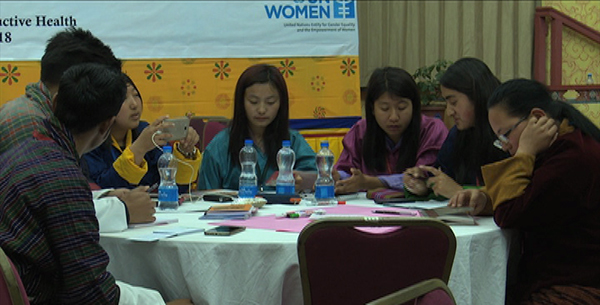 The number of women candidates for the upcoming parliamentary elections is dismal this time too. In fact, the figure has gone down compared to 2013 elections.
The number of women candidates for the upcoming parliamentary elections is dismal this time too. In fact, the figure has gone down compared to 2013 elections.
In the primary round of 2013 elections, 31 women contested but this time there are only 19 women candidates against 169 men.
Bhutan Kuen-Nyam Party (BKP) has the highest number of women candidates at seven, followed by Druk Nyamrup Tshogpa (DNT) and Druk Phuensum Tshogpa (DPT) with five each.
The People’s Democratic Party (PDP) has two.
The political parties think public perception of politics being dirty and corrupt is to be blamed for the poor women participation.
“We prioritize competence, meritocracy, talent, experience and knowledge. So, without discriminating between women and men, we had been trying to fill in good, capable, committed, passionate candidates,” Sonam Tobgay, the Vice President of BKP, said.
“What we need is a person who can lead and represent the constituency. If in a constituency, there’s a man and a woman who are interested and equally good with leadership quality, our party would give preference to the woman,” Tenzin Lekphell, the General Secretary of DNT, said.
“We don’t decide whether we want a male or a female candidate from any constituencies. If women are interested, we give them opportunity and it is similar with men too. We do not differentiate between men and women,” Sangay Phurba, the General Secretary of DPT, said.
“Politics is a game aimed at winning elections. What I experienced so far is that the candidates are nominated based on their ability to win election in addition to their other qualifications. But if there are two candidates, a male and a female, with the same ability to win, and other requirement, the female candiadte is seen to be the first choice,” Dorji Choden, the Vice President of PDP, said
The political parties say although there is no concrete solution to increase women’s participation in politics, it is important to create conducive environment and laws to encourage more women to come forward.
“Regardless of gender, the view towards politics and politician needs to be changed in the sense the larger audience should brace politics as something very noble, scared, and as a sense of duty towards one’s country. Currently, politics and politicians are viewed as authoritarian, power hungry, corrupt, so on and so forth,” BKP’s Sonam Tobgay said.
“All political parties are aware that there has to be more women representation and I feel all are working towards it. We are also happy that NGOs like BENEW, BAOWE and other agencies are making efforts to educate, motivate, and encourage women to join politics. So, the trend is positive,” DNT’s Tenzin Lekphell said.
“It is important to educate women on leadership and encourage them to come forward by creating conducive environment,” DPT’s Sangay Phurba said.
“Women friendly and responsive policies, laws and strategies are required. During 2013, PDP pledged to initiate quota system for women. But after a number of meetings, the idea was not welcomed, especially by the educated women, stating that such a system further undermines women’s capability,” PDP’s Dorji Choden said.
“To increase women representation in parliament, quota with proper definition and conditions can still be a good option. Election Law can mandate political parties to have some minimum women candidate at the nomination level.”












